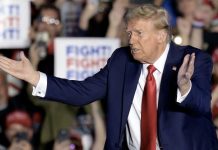
March 5 (UPI) — President Donald Trump said Monday he won’t back away from a promise he made a week ago to introduce new tariffs for foreign-made steel and aluminum — a measure, he says, to protect American industry workers.
Speaking to reporters at the White House, Trump reiterated his support for the new taxes — amid wavering Republican support and international backlash.
“No, we’re not backing down,” Trump said. “We had a very bad deal with Mexico, a very bad deal with Canada — it’s called [the North American Free Trade Agreement]….For many years, NAFTA’s been a disaster.”
Earlier Monday, Trump tweeted that the new tariffs could be removed if the United States renegotiated a better deal with NAFTA.
A trade deal struck by former President Bill Clinton, NAFTA has been the target of renegotiation since Trump took office a year ago.
“We have large trade deficits with Mexico and Canada. NAFTA, which is under renegotiation right now, has been a bad deal for U.S.A. Massive relocation of companies & jobs. Tariffs on Steel and Aluminum will only come off if new & fair NAFTA agreement is signed,” Trump wrote in the tweet.
“Also, Canada must treat our farmers much better. Highly restrictive. Mexico must do much more on stopping drugs from pouring into the U.S. They have not done what needs to be done. Millions of people addicted and dying.”
Trump said the steel and aluminum tariffs are designed for the protection of U.S. workers — and suggested he would welcome a trade war.
Since Trump’s announcement last week, some congressional Republicans have expressed concern for the possibility of the new tariffs. Monday, House Speaker Paul Ryan issued a rare dissent.
“We are extremely worried about the consequences of a trade war and are urging the White House to not advance with this plan,” AshLee Strong, a spokeswoman for Ryan’s office, said in a statement. “The new tax reform law has boosted the economy and we certainly don’t want to jeopardize those gains.”
Trump’s plans have been met negatively by some world leaders. China said it would “protect its interests,” and Canadian Prime Minister Justin Trudeausaid he was “confident we’re going to continue to be able to defend Canadian industry.”
British Prime Minister Theresa May said she spoke with Trump by phone Sunday and raised a “deep concern.”
Only the EU, though, has announced potential retaliation so far.
EU Commissioner for Trade Cecelia Malmstrom said U.S. exports to Europe — like bourbon and jeans — could face the 25 percent tax in response to the steel and aluminum taxes.
“We are looking at possibilities to retaliate, meaning we will also put taxes or tariffs on U.S. imports to the European Union,” she said.
In a video statement, Malmstrom said the new U.S. tariffs are “motivated by internal security.”
“We can’t see how the EU can be a threat to internal security in the U.S,” she said, adding that the EU could take the issue to the World Trade Organization.
The EU prepared a $3.45 billion list of U.S. goods to be targeted in retaliation — including U.S. steel and agricultural products like rice, orange juice and cranberries.
WTO Director-General Roberto Azavedo said “the potential for escalation is real. A trade war is in no one’s interest.”
The threat of a trade war prompted Swedish appliance maker Electrolux to postpone plans to build a $250 million investment in Tennessee.
“We’re concerned about the impact that the tariffs could have on the competitiveness of our U.S. operations,” Electrolux said.
Shares in European car makers traded lower on Monday after Trump suggested a tax on automobiles imported from Europe.





